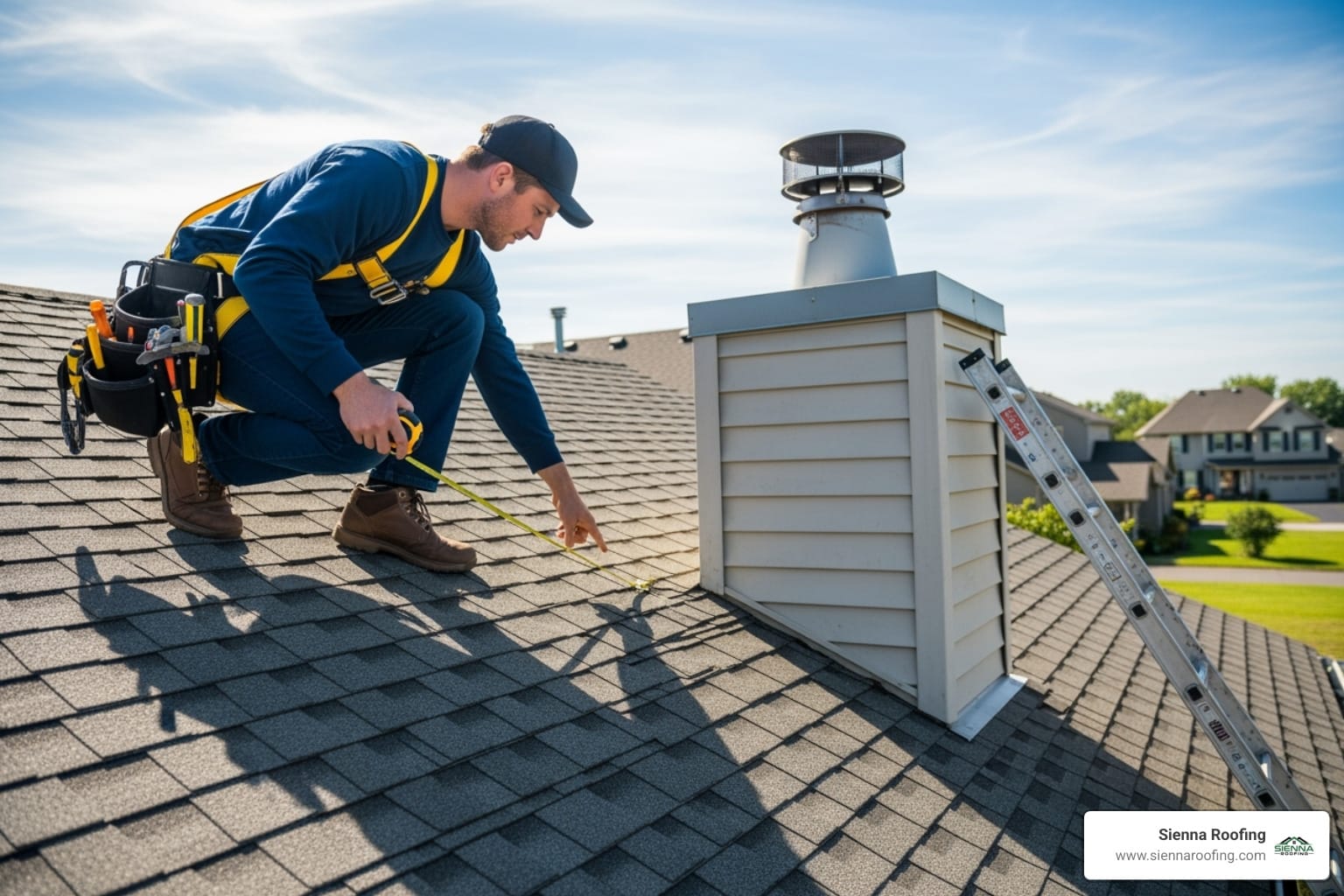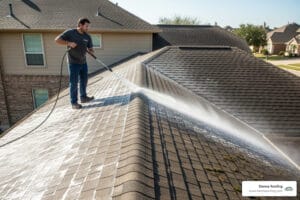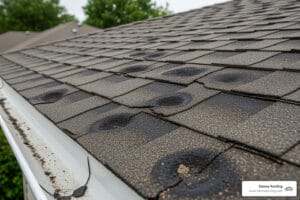Residential Roofers Near Me: 10 Top Tips
Why Finding Quality Residential Roofers Near Me Matters for Your Home
When your home’s first line of defense needs attention, finding residential roofers near me is essential, especially in a climate as demanding as Houston’s. Your roof endures a relentless cycle of blistering sun, torrential downpours, high humidity, and the ever-present threat of hurricanes and hail. These extreme conditions accelerate wear and tear, making proactive maintenance and timely repairs non-negotiable. Whether you’re dealing with storm damage, aging materials, or mysterious leaks, the right local contractor can mean the difference between a quick fix and years of recurring problems and escalating costs. Finding trusted local roofing professionals starts with knowing what to look for and which questions to ask.
Quick Answer: How to Find Top Residential Roofers Near Me:
- Check online reviews on Google, Yelp, and the Better Business Bureau (BBB).
- Verify licensing and insurance; in Texas, look for voluntary certifications like RCAT.
- Look for manufacturer certifications like GAF Master Elite®, a sign of top-tier quality.
- Get multiple written estimates from at least 3-4 different contractors to compare scope and price.
- Ask for local references from recent projects and check their work if possible.
- Confirm warranty coverage for both materials (manufacturer) and workmanship (contractor).
The stakes are high. According to industry data, the average roof replacement costs between $5,890 and $12,800, with labor making up about 60% of the total. With so many options available, a reputable contractor will stand out with proper licensing, robust insurance, elite manufacturer certifications, and a long track record of satisfied customers in your specific area.
I’m Andre Castro, CEO and founder of Sienna Roofing & Solar. With over five years of experience helping homeowners connect with reliable residential roofers near me throughout the Houston Metro area, my background in Construction Management from the University of Houston has given me a deep understanding of the unique challenges our local properties face. I’ve seen firsthand how a poorly installed roof can fail during a tropical storm, and I’ve also seen how a quality roofing system can protect a family’s most valuable asset for decades. This guide is built on that experience, designed to empower you to make the best possible decision for your home.
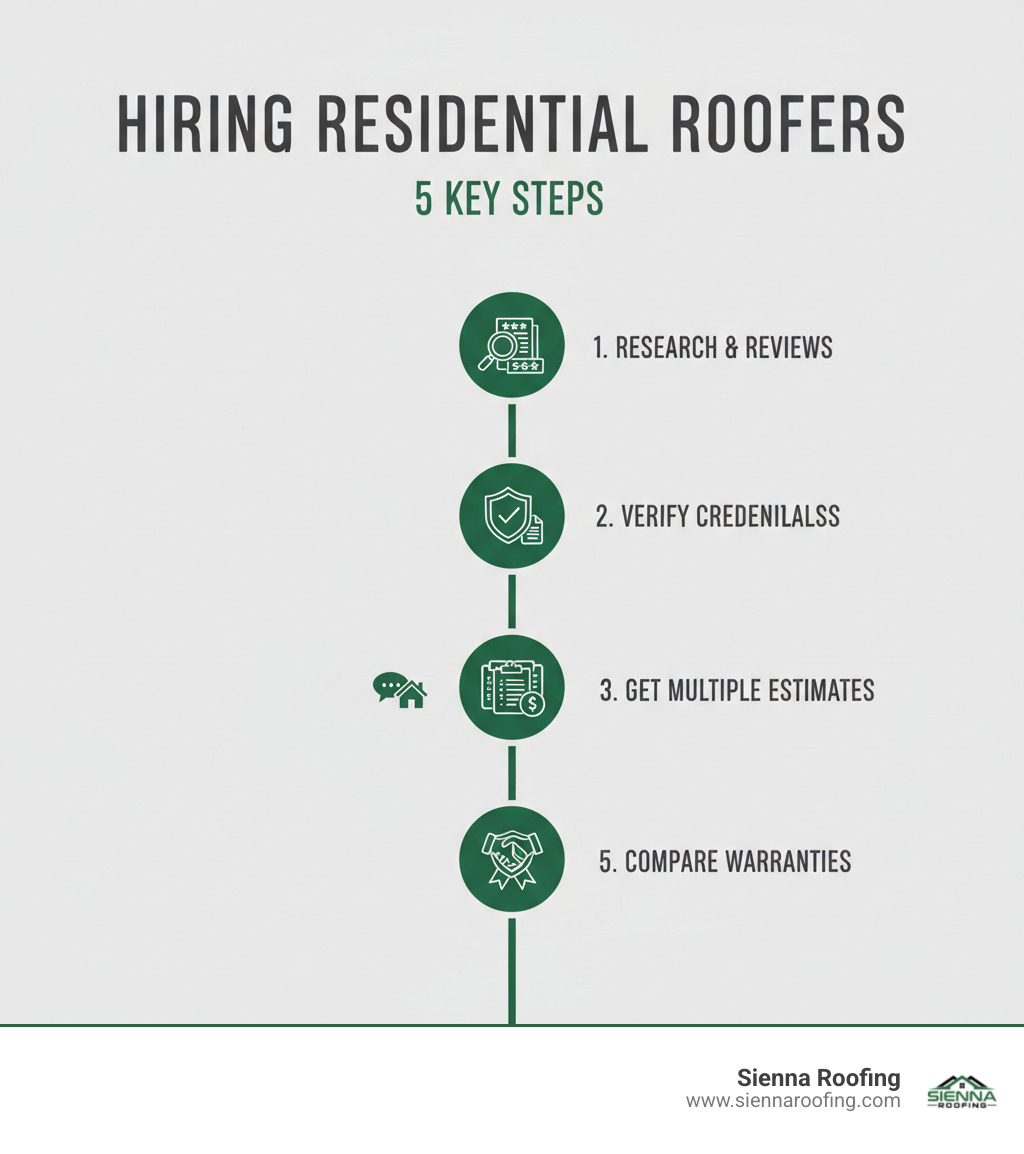
Know When to Call a Roofer: 7 Telltale Signs Your Roof Needs Attention
Your roof quietly stands guard 24/7, but it can’t do its job forever without some TLC. The trick is catching problems before they turn into wallet-draining disasters. Too many homeowners wait until water is dripping into their living room before searching for residential roofers near me, but your roof usually gives plenty of warning signs. Catching them early can often mean the difference between a simple repair and a full-scale replacement.
At Sienna Roofing, we’ve seen what happens when small issues get ignored, and it’s never pretty. Here are the seven telltale signs that it’s time to call a professional for an inspection.
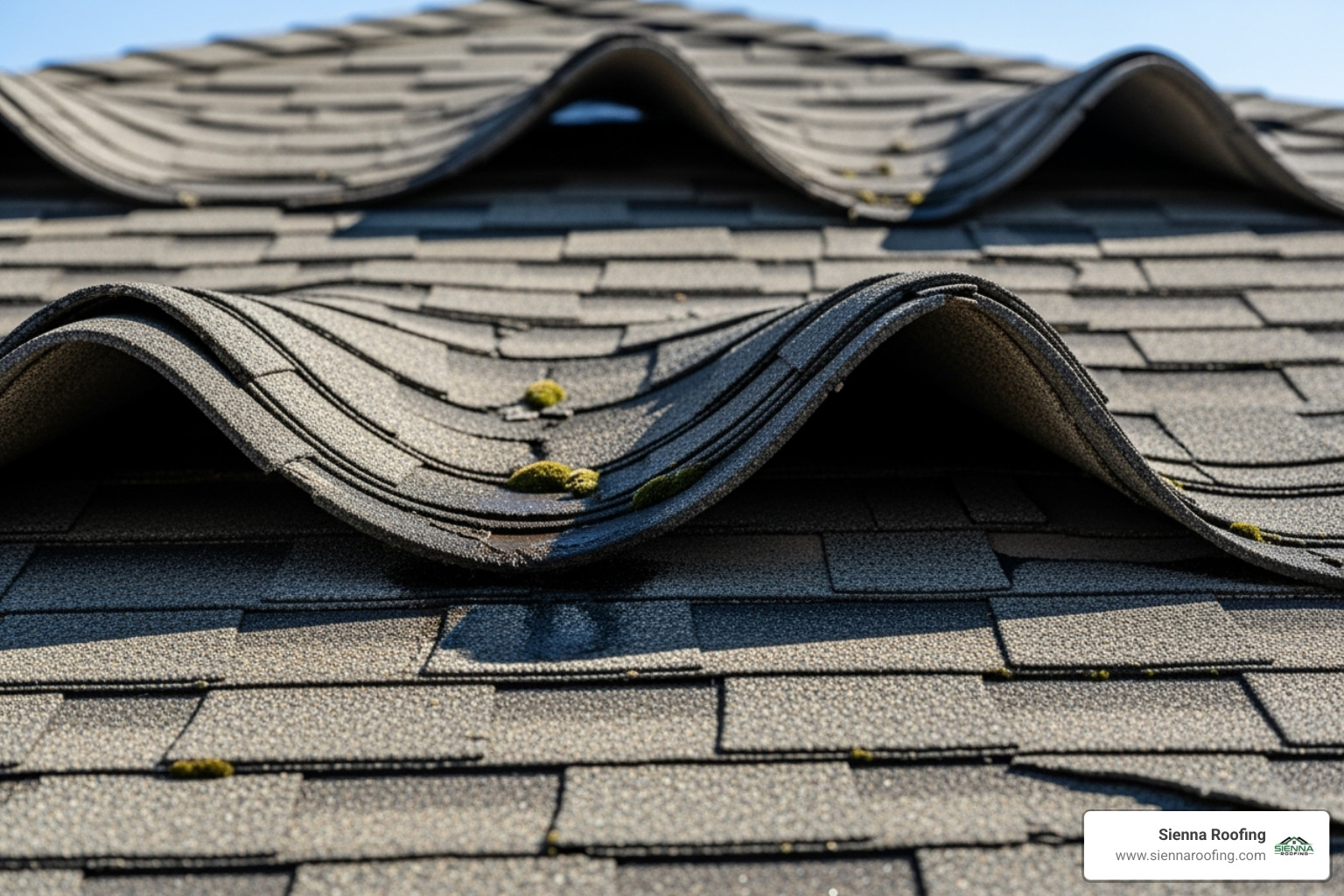
Signs You Need a Roof Repair or Replacement
- Roof age over 20 years: Most asphalt shingle roofs are designed to last 20-25 years. Intense Houston sun can shorten this lifespan. As the oils in the asphalt dry out, shingles become brittle and less effective. If your roof is approaching this age, it’s time for a professional inspection, even if it looks okay from the ground.
- Missing granules: Those sand-like granules are the shingle’s primary defense against UV radiation. Think of them as sunscreen for your roof. When you see them collecting in your gutters or notice ‘bald’ spots, it means the shingle’s protective layer is gone, and it’s rapidly deteriorating.
- Water stains: Stains on ceilings or walls are a clear sign of a leak. Don’t just paint over them. The entry point may be far from the stain, as water can travel along rafters and wall frames before showing itself. A professional can trace the leak to its source to prevent structural damage and mold growth.
- Damaged flashing: Flashing consists of metal strips installed around chimneys, vents, skylights, and in roof valleys. It’s a critical water barrier. If this flashing is cracked, rusted, or has pulled away from the roof, it creates a direct path for water to enter your home. This is one of the most common sources of roof leaks.
- Sagging roof deck: A spongy or sagging roof is a major red flag. It indicates the underlying sheathing or framing is compromised by moisture and is likely rotting. This is a serious structural issue that requires immediate professional attention to prevent a potential collapse.
- Moss or algae growth: While it may look rustic, moss and algae are harmful. Moss holds moisture against the shingles, causing them to degrade, while the dark streaks of blue-green algae (Gloeocapsa magma) feed on the limestone filler in asphalt shingles. Both signal that your roof is retaining moisture, likely due to poor drainage or shade.
- Curling or buckling shingles: When shingles curl at the edges or buckle in the middle, they are past their prime. Curling is often caused by moisture absorption, while buckling can result from improperly installed felt or movement in the roof deck. In either case, the shingles can no longer lie flat and effectively shed water, making them easily torn off by wind.
If you notice any of these red flags, don’t wait. A professional inspection can determine if a simple repair will suffice or if a replacement is necessary to protect your home’s integrity.
How to Extend Your Roof’s Lifespan
A little proactive maintenance can add years to your roof’s life and delay a costly replacement.
- Regular inspections: A professional check-up once a year and after every major storm can catch small issues before they become major expenses. A trained eye can spot subtle damage you might miss from the ground.
- Keep gutters clean: Clogged gutters cause water to back up and pool on the roof’s edge. This water can seep under shingles and rot the underlying wood (fascia and soffit). Clean them twice a year, in late spring and late fall.
- Trim overhanging branches: Branches that scrape the roof surface can wear away granules. Falling leaves and pine needles can trap moisture and promote algae growth. Keep branches trimmed at least 10 feet from your roofline to prevent damage and debris buildup.
- Promptly repair minor damage: A few missing or damaged shingles might not seem like a big deal, but they expose the underlayment to the elements. Addressing these small problems quickly for a few hundred dollars can prevent thousands in water damage repairs later.
- Ensure proper attic ventilation: A well-ventilated attic is crucial in Houston’s climate. Good airflow, using a system of soffit and ridge vents, prevents heat and moisture buildup. This stops your shingles from being ‘baked’ from below in the summer and prevents moisture condensation that can lead to rot in the winter.
Vetting Your Options: How to Find Reputable Residential Roofers Near Me
The search for trustworthy residential roofers near me doesn’t have to be overwhelming. With thousands of contractors across Texas, the key is knowing where to look and what to ask. At Sienna Roofing, we believe transparency helps homeowners separate the pros from the pretenders.
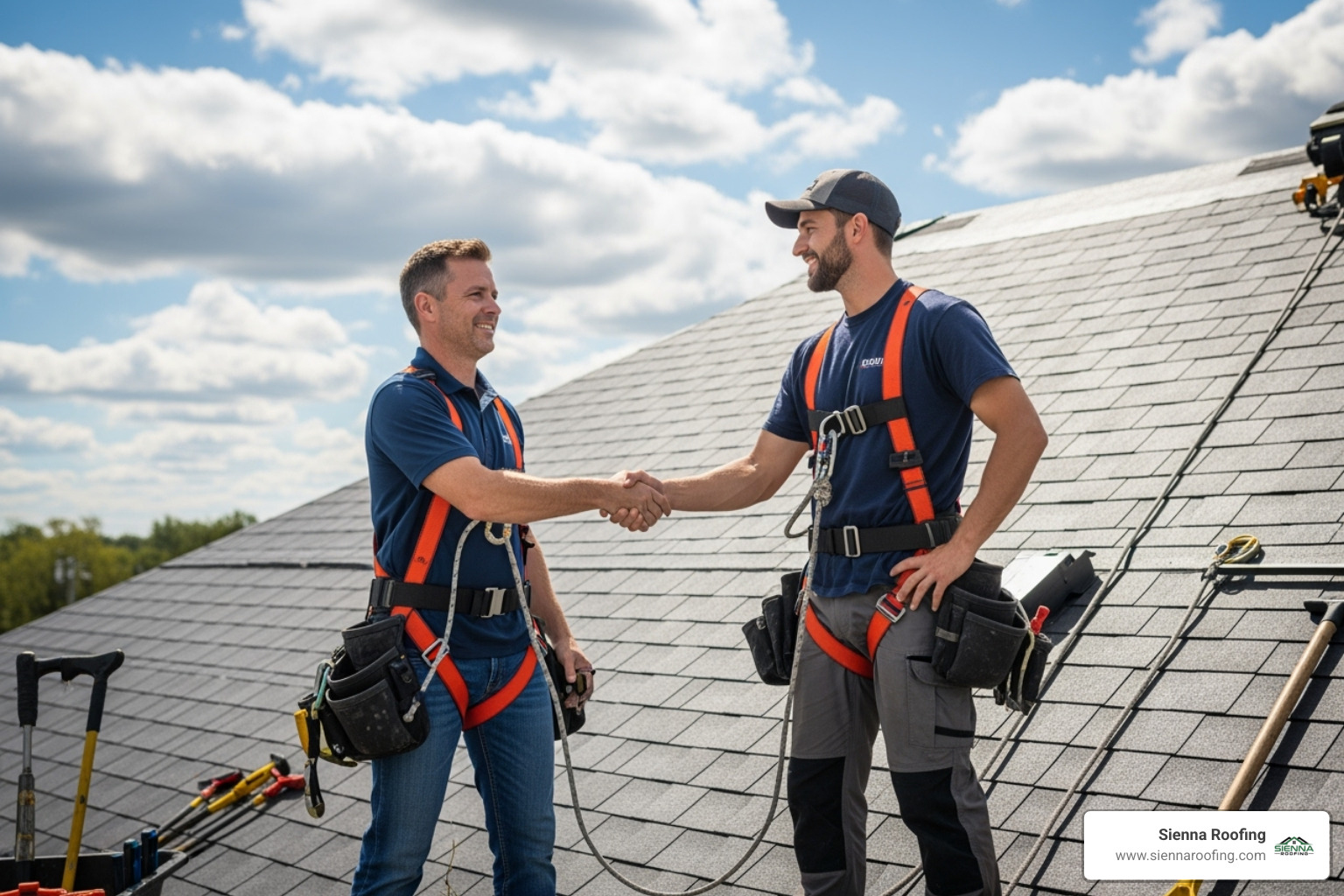
Where to Find the Best Residential Roofers Near Me
- Online Reviews: Check Google, Yelp, and the Better Business Bureau for patterns in customer feedback. Look beyond the star rating. Read reviews that mention communication, cleanliness, timeliness, and how the contractor handled unexpected issues or negative feedback.
- Word-of-Mouth: Ask neighbors, friends, and local community groups for recommendations. They can provide honest insights, and you can often see the finished work for yourself. A roofer who has built a strong local reputation is often a safe bet.
- State Licensing Boards & Associations: This is non-negotiable. In Texas, roofing is an unlicensed trade at the state level, which makes vetting contractors even more critical. However, reputable roofers often seek voluntary licensing through organizations like the Roofing Contractors Association of Texas (RCAT). An RCAT license signifies that the contractor has passed business and safety exams, is properly insured, and is committed to ethical practices. Always ask if a contractor holds this voluntary license and verify their insurance.
- Manufacturer Certifications: Credentials from industry leaders like GAF signal a commitment to quality and ongoing training. You can also find a roofing contractor near you through the Better Business Bureau. We encourage you to check our customer reviews to see what homeowners in our community have to say.
The Importance of GAF Certification
When evaluating residential roofers near me, GAF certification is a key indicator of quality. Here’s why it matters so much.
- GAF Master Elite® Status: This is the highest level of certification, earned by fewer than 2% of contractors nationwide. It requires the roofer to be fully licensed and insured, have a proven reputation for excellence, and be committed to ongoing professional training. It’s the ultimate mark of a reliable and skilled contractor.
- Access to Superior Warranties: Only Master Elite® contractors can offer GAF’s best warranties, like the Golden Pledge® Warranty. This provides up to 50 years of non-prorated coverage on materials and up to 25 years on workmanship, backed directly by GAF. This peace of mind is invaluable.
- Factory-Trained Installers: GAF-certified crews are trained by technical experts to install roofing systems to exact manufacturer specifications. This is crucial because improper installation is the number one cause of roof failure and can void your material warranty.
- Commitment to Professionalism: These contractors adhere to strict ethical standards, ensuring transparent communication, fair pricing, and a focus on long-term customer satisfaction.
We are proud to hold GAF Master Elite® certification, as it reflects our unwavering dedication to delivering the highest quality roofing solutions. You can explore the full benefits of hiring a GAF-certified contractor to understand the complete advantage.
The Nitty-Gritty: Services, Materials, and Warranties Explained
Understanding what residential roofers near me actually offer can feel complex, but knowing the basics makes decisions much easier. This crash course will cover the essential services, common materials, and crucial warranty details to help you feel confident about your roofing investment.
At Sienna Roofing, we explain your options clearly, with no confusing jargon or surprise costs. Our complete range of residential roofing services is designed to protect your home and budget.
Common Services Offered by Local Roofers
Reputable companies offer a full spectrum of services to address any roofing need:
- Roof Inspections: A thorough assessment to identify current and potential issues, often including a detailed report with photos.
- Roof Repairs: Targeted fixes for specific problems like missing shingles, damaged flashing, or small leaks, typically costing between $380 and $1,800.
- Full Roof Replacement: A complete tear-off of old materials down to the deck, inspection of the decking, and installation of a new roofing system.
- New Roof Installation: For new construction projects or home additions, ensuring the roof is built correctly from the ground up.
- Emergency Tarping: Temporary protection after storm damage to prevent further water intrusion while you arrange for repairs or insurance claims.
- Gutter Installation & Repair: Essential for proper water management to protect your roof, siding, and foundation from water damage.
- Attic Ventilation Analysis: Evaluating and correcting attic airflow to reduce energy costs and extend the life of your roof.
Choosing Your Roofing Material
Your choice of material impacts your home’s appearance, energy efficiency, durability, and budget.
- Asphalt Shingles: The most popular choice in the U.S., lasting 20-25 years. They are affordable ($3-7 per sq. ft. installed) and come in many styles, from basic 3-tab to thicker, more durable architectural shingles. However, they are less durable in extreme heat compared to other options.
- Metal Roofing: Highly durable with a 40-70 year lifespan. Metal (like standing seam or R-panel) is energy-efficient, fire-resistant, and stylish, but costs more upfront ($7-12 per sq. ft.) and can be noisy during rain if not installed with proper insulation.
- Tile Roofing: Offers timeless elegance and can last 50-100+ years. Clay and concrete tiles are fire-resistant and excellent for hot climates, but they are heavy, requiring structural reinforcement, and expensive ($10-18 per sq. ft.).
- Composite/Synthetic Shingles: A modern, high-performance option lasting 50+ years. Engineered from recycled materials, they mimic the look of slate or wood shake without the weight or maintenance. They offer superior impact and fire resistance but come at a premium price ($9-15 per sq. ft.).
Understanding Your Roof Warranty
A good warranty is crucial. If a roofer is vague about warranty details, consider it a major red flag.
- Workmanship Warranty: This is the contractor’s guarantee on their installation quality. A quality contractor will offer a warranty of 10-25 years, or even a lifetime, to guarantee their work against leaks or errors.
- Manufacturer Warranty: This covers defects in the roofing materials themselves. Leading brands like GAF offer robust, long-term coverage, but only if the materials are installed to their exact specifications.
- Prorated vs. Non-Prorated: This is a critical distinction. Prorated warranties lose value over time. A non-prorated warranty offers full coverage for a set period. For example, on a $12,000 roof with a 30-year prorated warranty that fails in year 15, the manufacturer might only cover 50% of the material cost, leaving you to pay for labor and the other half of materials. With a 20-year non-prorated warranty, 100% of materials and labor would be covered in year 15. Always ask for the longest non-prorated term available.
- What to Look For: A strong warranty package covers materials, labor, tear-off, and disposal costs. A transferable warranty also adds significant value if you sell your home. Get every detail in writing.
Talking Turkey: Understanding Roofing Costs and Insurance Claims
When searching for residential roofers near me, understanding the financial side of the project is critical. Roofing costs vary widely, but knowing the factors involved and how to handle insurance claims can help you budget effectively and avoid surprises.
We’ve helped countless homeowners in the Houston Metro area navigate these financial aspects, and we’re here to break it down for you.

What Determines the Cost of a Roofing Project?
Several key factors influence the final price of a new roof:
- Roof Size and Pitch: Larger and steeper roofs require more materials, more complex safety setups, and more labor hours, directly increasing the cost.
- Material Choice: This is a major cost driver. Architectural asphalt shingles are a popular mid-range choice, while materials like standing seam metal, tile, and composite shingles are premium options with higher upfront costs but longer lifespans.
- Extent of Damage: A simple shingle-over might be cheaper, but if a full tear-off reveals rotted decking or damaged fascia boards, the scope and cost of the project will increase to ensure a solid foundation for the new roof.
- Labor Rates: Typically accounting for 60% of the total cost, rates vary by location and contractor expertise. Skilled, certified teams may charge more, but their precision and efficiency prevent costly future repairs and ensure warranty compliance.
- Tear-Off & Disposal: Removing one or more layers of old shingles adds significant labor and disposal fees but is essential for a high-performing new roof and for inspecting the underlying deck.
- Accessibility and Complexity: A roof that is difficult to access or has many features like chimneys, skylights, and valleys requires more detailed labor, increasing the cost.
Complete replacements average $5,890 to $12,800, while high-end roofs with premium materials can exceed $46,000. We provide detailed and transparent roof estimate costs so you know exactly what you’re paying for.
How to Handle a Roof Insurance Claim
Storm damage is stressful, but managing the insurance claim doesn’t have to be. As insurance claim specialists, we know what it takes to get your claim approved.
- Document Everything: After a storm, safely take photos and videos of all visible damage to your roof, siding, gutters, and property. Detailed evidence is your most powerful tool.
- Contact Your Insurer: Report the claim immediately, as most policies have strict deadlines. Provide the date of the storm and a general description of the damage.
- Get a Professional Roof Inspection: Before the adjuster visits, have a reputable roofer inspect the roof. They will document all damage with photos and create a detailed estimate, which can be used as a benchmark.
- Have Your Roofer Present for the Adjuster’s Inspection: This is a game-changer. An experienced roofer can point out damage the insurance adjuster might miss, ensuring all legitimate damage is included in the claim. This can add thousands of dollars to your approved amount.
- Understand Your Policy: Know your deductible, coverage limits, and any exclusions. Ask your roofer about local building codes that may require upgrades not included in a basic replacement cost.
- Review the Adjuster’s Report: Carefully compare the insurance adjuster’s scope of work with your roofer’s estimate. If there are discrepancies, your roofer can submit a supplement to the insurance company with evidence to justify the additional work or costs.
For a complete walkthrough, see our roof insurance claim guide. We work with insurance providers daily to make the process as smooth as possible for you.
The Hiring Checklist: 10 Questions to Ask Before You Sign
Choosing the right residential roofers near me is a critical decision. Your roof protects your entire home, so this isn’t the time to cut corners. A reputable contractor will welcome your questions and answer them with confidence and transparency. If a roofer seems annoyed or gives vague answers, that’s a clear sign to keep looking.

Key Questions for Your Potential Residential Roofers Near Me
Use this checklist to protect your investment and ensure quality work.
- Are you licensed and insured?
- Why it Matters: This is the most important question. Ask to see current certificates for general liability and worker’s compensation. Liability insurance covers damage to your property, while worker’s comp protects you from being sued if a crew member is injured on your property. Without both, you are financially exposed.
- Can you provide local references?
- Why it Matters: A good contractor will have a long list of happy customers. Call recent references and ask about their experience with communication, cleanliness, and overall quality. A contractor who can’t provide references is a major red flag.
- What is your GAF certification level?
- Why it Matters: GAF Master Elite® status is the gold standard, indicating top-tier professionalism and giving you access to the best warranties in the industry. It proves the contractor is established, reputable, and properly trained.
- Who will be my project manager?
- Why it Matters: A dedicated point of contact ensures clear communication and accountability. You should know exactly who to call with questions or concerns, rather than being passed around an office.
- How will you protect my property?
- Why it Matters: A roofing project is messy. A professional crew will explain how they’ll use tarps to protect your landscaping, siding, and windows. They should also describe their cleanup process, including using magnetic sweepers to find stray nails.
- What does your workmanship warranty cover?
- Why it Matters: This warranty covers installation quality and is a direct reflection of the contractor’s confidence in their work. Understand its length (10+ years is a good sign) and what it includes. A weak workmanship warranty suggests the contractor may not be around to fix future problems.
- Will you remove the old roof?
- Why it Matters: A complete tear-off is best practice. Installing new shingles over old ones (a “roof-over”) adds weight and can hide underlying problems like soft or rotted decking. A tear-off allows for a proper inspection and ensures the new system is installed on a solid foundation.
- What is the payment schedule?
- Why it Matters: Be wary of contractors demanding a large deposit or full payment upfront. A typical schedule involves a deposit for materials (10-30%), possible progress payments, and a final payment only after the project is complete and you are satisfied.
- How do you handle unexpected issues?
- Why it Matters: Surprises like rotted decking can happen. A professional will have a clear process outlined in the contract for communicating these issues, explaining the options, and getting your written approval before proceeding with additional work and costs.
- What is the estimated timeline and how do you handle delays?
- Why it Matters: An experienced contractor can provide a realistic schedule (e.g., 2-3 days for a standard replacement). They should also be able to explain their process for handling weather delays or material backorders, ensuring you are kept informed throughout.
At Sienna Roofing, we welcome these questions. We are fully licensed, insured, and GAF Master Elite® certified, with a reputation built on transparency and quality work.
Name: Sienna Roofing
Address: 17034 University Blvd, Sugar Land, TX 77479
Phone: (832) 564-3322
Conclusion
Finding the right residential roofers near me doesn’t have to be a stressful search. By recognizing the warning signs of roof failure, vetting contractors thoroughly by checking their credentials and references, and asking the right questions before signing a contract, you are now equipped to make a confident and informed decision for your home.
Your roof is more than just shingles; it’s your home’s primary shield against the elements, a major factor in your property value, and a significant investment in your family’s safety and comfort. Choosing a quality, local contractor wisely provides years of invaluable peace of mind.
Here at Sienna Roofing, we’ve built our reputation on personalized, community-driven service throughout the Houston Metro area, including Sugar Land, Missouri City, Katy, and Richmond, TX. We aren’t a faceless national chain; we’re your neighbors, and we treat every project with the care it deserves, as if it were our own home. Our 100% satisfaction guarantee isn’t just a slogan; it’s our promise to stand behind our work, from simple repairs to complete replacements, ensuring your peace of mind long after the job is done.
When you’re ready to partner with a team that puts quality, transparency, and customer satisfaction first, we’re here to help. Our GAF Master Elite® certified experts bring years of local experience and genuine care to every job. Contact our expert roofing team today for a free, no-obligation inspection! Let’s work together to protect your most important investment.
